Government takes majority shares in TAP and Efacec in midst of pandemic

The minority government of António Costa saved this month two strategic companies, securing thousands of jobs. It bailed out flagship airline TAP and nationalised Efacec, the technological company – with over 2500 highly qualified employees and activities in more than 60 countries – brought down by its association with the former first daughter of Angola and richest women in Africa, Isabel dos Santos.
Efacec Power Solutions is not nearly as important as TAP. The idea is only for a temporary nationalisation until the end of the year in order to guarantee that salaries and bank loans can be paid, and the confidence of clients and suppliers restored. A dozen potential buyers from Portugal, Spain, the US and China are on the horizon and it’s only a matter of time before the company is reprivatized.

Buying up Isabel dos Santos’ majority (72%) share in Efacec is moreover a decent way to get rid of her involvement – which has done the company no good since her name was reviled across the media around the world for pillaging her homeland of hundreds of millions, and her assets frozen in Portugal and Angola.
Despite the nightmare of what to do with TAP – crippling losses in recent years exacerbated by a further 395 million loss in the first two months of this year – on the long run, the government has taken a clear stand. ‘TAP is fundamental for our territorial continuity, for our connection to the world and our economic development’, declared PM António Costa. The airline – with a workforce of 10.000 and contributing 2.6 billion to the export in 2019 – is just too important for the nation to let it fall.

By spending 55 million to buy out the American private shareholder David Neeleman, and committing to an injection of 1,2 billion – approved by Brussels – into the company, the state now effectively controls TAP with 72% of the capital and took the ‘worst-case scenario of nationalisation’ off the table.

As the company is in technical bankruptcy with a debt of over 775 million euros, the approval of Brussels will, by all means, imply a substantial restructuring, including a reduction in the number of routes and planes and consequences on employment.
Since the beginning of the pandemic crisis, more than 1000 fixed-term workers have been dismissed due to non-renewal of contracts but undoubtedly more layoffs will follow in the next months.
Stay healthy Fique saudável (pic Público/Sapo)































 Portugal’s successful battle against Covid-19 has come under international media spotlight and regarded by many as exemplary. With a quarter of the population of big brother Spain, Portugal has around one-tenth of the number of cases and a three times lower mortality rate.
Portugal’s successful battle against Covid-19 has come under international media spotlight and regarded by many as exemplary. With a quarter of the population of big brother Spain, Portugal has around one-tenth of the number of cases and a three times lower mortality rate. There are a number of different theories for why the virus has caused so much less suffering than in neighbouring Spain.
There are a number of different theories for why the virus has caused so much less suffering than in neighbouring Spain.
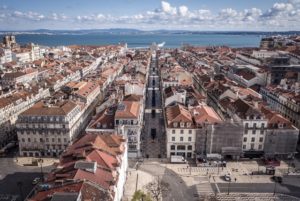 Lisbon’s streets are left to joggers and cats, its glorious beaches cordoned off, the economy asphyxiated, border crossings to Spain sealed, schools and universities
Lisbon’s streets are left to joggers and cats, its glorious beaches cordoned off, the economy asphyxiated, border crossings to Spain sealed, schools and universities  Nevertheless, the government prepares to gradually
Nevertheless, the government prepares to gradually 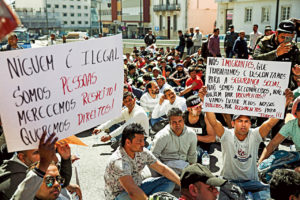 All migrants, including asylum seekers with pending applications at immigration (Serviço de Estrangeiros e Fronteiras), will be treated as permanent residents until at least July 1, granting them full access to the National Health Service, welfare benefits, bank accounts, work, and rental contracts during the corona outbreak.
All migrants, including asylum seekers with pending applications at immigration (Serviço de Estrangeiros e Fronteiras), will be treated as permanent residents until at least July 1, granting them full access to the National Health Service, welfare benefits, bank accounts, work, and rental contracts during the corona outbreak. The
The 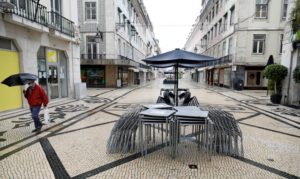 Portugal declared the State of
Portugal declared the State of  Schools in Portugal even closed before any deaths were registered.
Schools in Portugal even closed before any deaths were registered. Portugal is doing comparatively well so far. But the authorities’ advice to stay at home and keep distance has to be maintained to prevent further suffering. Researchers at the Imperial College in London suggested that without these measures deaths in Portugal could reach 70,000.
Portugal is doing comparatively well so far. But the authorities’ advice to stay at home and keep distance has to be maintained to prevent further suffering. Researchers at the Imperial College in London suggested that without these measures deaths in Portugal could reach 70,000.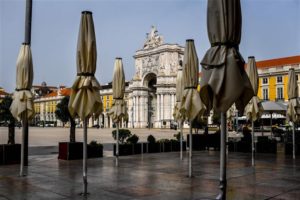 With the peak of the virus predicted in May, it is becoming increasingly clear that quarantine measures in Portugal probably have to stay in force till the end of June.
With the peak of the virus predicted in May, it is becoming increasingly clear that quarantine measures in Portugal probably have to stay in force till the end of June. To finish off with a quote of the famous Dutch footballer Johan Cruijff ‘ every disadvantage has its advantage.’
To finish off with a quote of the famous Dutch footballer Johan Cruijff ‘ every disadvantage has its advantage.’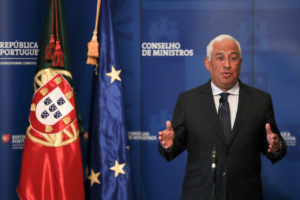 When the number of confirmed coronavirus cases surpassed the 1,000 mark – with six reported deaths – the Portuguese Government announced the State of
When the number of confirmed coronavirus cases surpassed the 1,000 mark – with six reported deaths – the Portuguese Government announced the State of 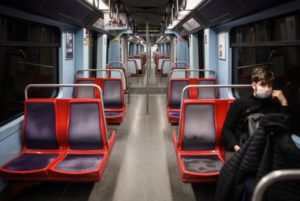 Non-essential business and schools closed. People urged to leave their houses only for food, medicines and walking the dog. Remote working from home became the rule.
Non-essential business and schools closed. People urged to leave their houses only for food, medicines and walking the dog. Remote working from home became the rule. 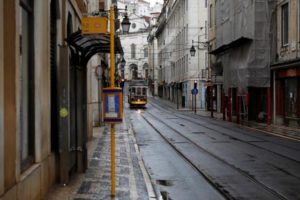 ‘Social distancing’ and ‘protecting the elderly’ have become keywords in the fight against the new virus – Severe Acute Respiratory Syndrome Corona Virus 2 (SARS-CoV-2).
‘Social distancing’ and ‘protecting the elderly’ have become keywords in the fight against the new virus – Severe Acute Respiratory Syndrome Corona Virus 2 (SARS-CoV-2). The intention of prime minister Antonio Costa is not to close the country down – like in France – even though he has the constitutional support with this State of Emergency to do so. The government, however, will – given the developments in Spain and Italy where the death tolls are the worst in Europe – implement further restrictions if necessary.
The intention of prime minister Antonio Costa is not to close the country down – like in France – even though he has the constitutional support with this State of Emergency to do so. The government, however, will – given the developments in Spain and Italy where the death tolls are the worst in Europe – implement further restrictions if necessary. The Socialist Government of Antonio Costa is convinced that upgrading Montijo Air Force Base 6 on the south bank of Lisbon’s Tagus estuary, is the best option.
The Socialist Government of Antonio Costa is convinced that upgrading Montijo Air Force Base 6 on the south bank of Lisbon’s Tagus estuary, is the best option. In addition, the national airline
In addition, the national airline  Moreover, at least 30.000 citizens in the Netherlands have signed a petition objecting to the ‘ecologically disastrous plan.’ It concerns the survival of Netherlands national
Moreover, at least 30.000 citizens in the Netherlands have signed a petition objecting to the ‘ecologically disastrous plan.’ It concerns the survival of Netherlands national  Researchers also say birds are at risk of colliding with aircraft and will be driven away by the noise. The reaction of Secretary of State Alberto Souto de Miranda was stunning ‘people should not worry because birds are not
Researchers also say birds are at risk of colliding with aircraft and will be driven away by the noise. The reaction of Secretary of State Alberto Souto de Miranda was stunning ‘people should not worry because birds are not  The latest obstacle in starting construction on a 1.3 billion euro project are two Communist-led
The latest obstacle in starting construction on a 1.3 billion euro project are two Communist-led